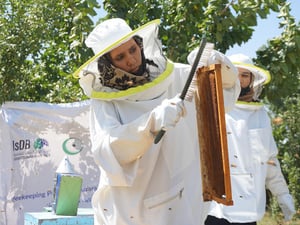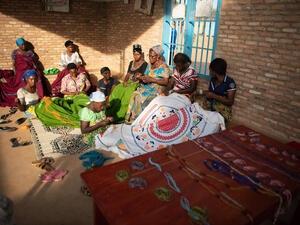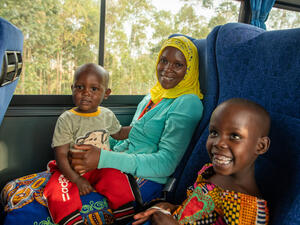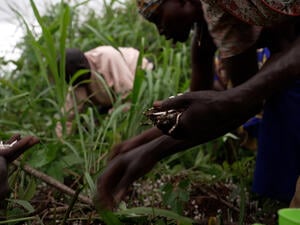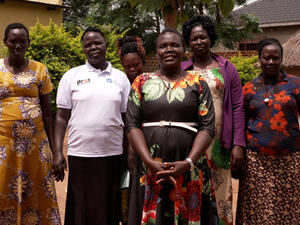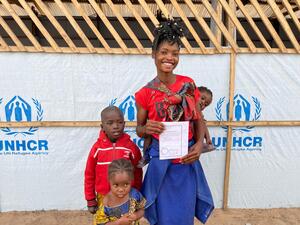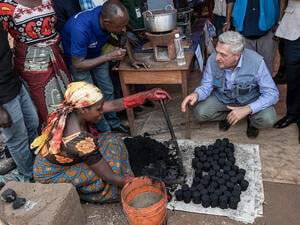UNHCR helps returnees fight HIV/AIDS in Liberia
UNHCR helps returnees fight HIV/AIDS in Liberia
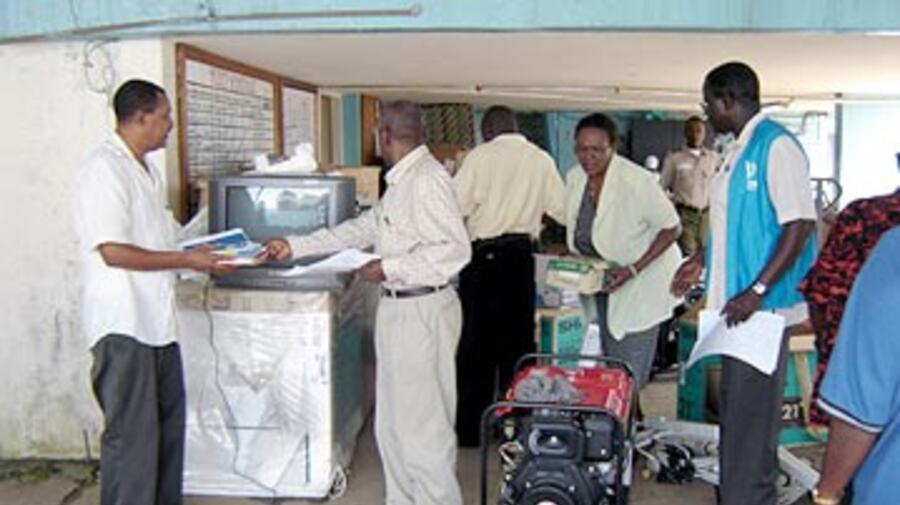
UNHCR staff in Liberia providing their implementing partners with technical equipment and materials to inform returnees about HIV/AIDS prevention.
MONROVIA, Liberia, Nov 18 (UNHCR) - As Liberia starts to heal the wounds from its 14-year civil war, the UN refugee agency has started an HIV/AIDS awareness campaign to fight the disease that could threaten the country's recovery.
Some 1,390 Liberian refugees have returned home on UNHCR convoys and airlifts since the agency started facilitating voluntary returns to Liberia in October. Another 70,000 have returned on their own since August last year, when the departure of former president Charles Taylor paved the way for peace.
Although the HIV prevalence of the returnees is unknown, they are coming back from host countries with an HIV prevalence of between 3 and 5 percent, with the exception of Côte d'Ivoire, where the rate is almost 10 percent. There is insufficient data to assess HIV prevalence within Liberia itself.
As conditions stabilise in Liberia and roads and other infrastructure improve, many of the estimated 340,000 Liberian refugees in the region and 500,000 internally displaced persons (IDPs) are expected to return home over the next few years. Such mass population movements could increase the risk of spreading the HIV virus in a country struggling to rehabilitate basic health care services.
To minimise the impact of the disease, UNHCR has launched an HIV/AIDS awareness campaign for Liberia's returning refugees, IDPs and local communities. The campaign aims to prevent infections and to change the public's attitudes toward HIV/AIDS. It seeks to educate them on risky behaviours that help spread the disease, giving people - especially youth and women - the knowledge to protect themselves against HIV infection.
Currently, all homebound Liberians pass through established entry points and transit centres, where they receive relief items, a two-month food package, and health care and information on HIV/AIDS prevention. Condoms are also included in the repatriation package.
"We would expect the returnees and communities to get educated about HIV/AIDS and to speak out freely about it," said UNHCR's Representative in Liberia, Moses Okello.
Between now and the end of November, refugee agency is training health workers from partner agencies like the International Medical Corps and Africa Humanitarian Action, as well as community health workers, peer educators and community leaders to build capacity in managing the spread of sexually transmitted infections. The trainees will in turn conduct training in their areas of operation on HIV/AIDS awareness and prevention, focusing on outreach and integrated condom promotion and distribution within the community and from health facilities like clinics and hospitals.
UNHCR has also provided equipment - television sets and video players - as well as educational videos and printed materials on HIV/AIDS to its implementing partners. Under the overall supervision and coordination of UNHCR, these partners will join the county health teams to convey the message in the seven priority counties of Lofa, Grand Gedeh, Grand Cape Mount, Maryland, Nimba, Bong and Montserrado.
"We will also encourage people to go for voluntary counselling and testing for HIV/AIDS when services are eventually available in all counties," noted Okello.
This year, UNHCR has hired an HIV/AIDS regional coordinator for West Africa and is spending an additional $25,000 on top of its existing funding for its HIV/AIDS programme in Liberia. The funds will be focused on awareness and prevention workshops for the community, as well as the procurement and production of materials and training for health workers, peer educators and community leaders.
The refugee agency is cooperating with the authorities and other agencies to implement the minimal HIV/AIDS interventions in accordance with the Inter-Agency Standing Committee's Guidelines for HIV/AIDS Interventions in Emergency Settings.
By Francesca Fontanini
UNHCR Liberia

